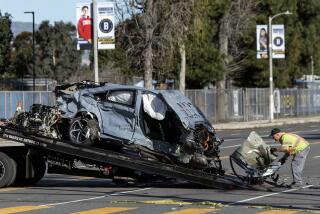Homeowners association should consider renter’s safety issue
- Share via
Question: We have been renting a condo and are in the process of buying it from the owner. My husband went to a board meeting to complain about the speeders on the association’s road in front of our condo. We made the board aware that vehicles speed down the street in early-morning hours going two or three times the posted 15-mph speed limit.
We asked the directors if they could install speed bumps where this is occurring. The board said no. The meeting minutes reported: Renter “expressed his concern about cars speeding in the streets by his home. He has requested that a speed bump be installed. Board told him that until he becomes a homeowner, the board will not act on his request.”
This is a safety issue, not an owner issue. How can we get the board to take action?
Answer: Although the board is not obligated to act on requests by renters, serious safety issues should be addressed regardless of the source. The board’s published reaction in the minutes makes it clear that the association is on notice of the potential for harm caused by speeders in your complex. The minutes also say the board will act on your request when you become an owner. But that will not prevent liability should something happen before that time.
A board’s duty to investigate safety issues relating to the association common property arises when the board receives notice that such issues exist. Speeders affect renters and owners alike, and injuries caused could result in association liability for failure to address speeding on association property. No matter whether the board chooses speed bumps or some other method of slowing the speeders down and enforcing the speed limits, it must take steps toward addressing the problem. A thorough investigation of available solutions should be undertaken, and if speed bumps turn out to be the best solution, the board should act to install them.
Any liability for injuries to you or your guests from speeders in the common streets or driveways would attach to those causing the injury. Even without injury, the association might also be liable if it knew of the potential danger but took no steps to correct it.
Send questions to P.O. Box 10490, Marina del Rey, CA 90295 or e-mail noexit@mindspring.com.
More to Read
Sign up for Essential California
The most important California stories and recommendations in your inbox every morning.
You may occasionally receive promotional content from the Los Angeles Times.













